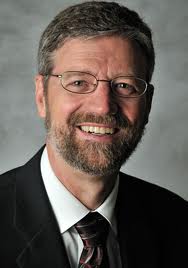By Ervin Stutzman
(and that of the church as well)
Power is a good thing to have in the church. It’s often like love and money. The more you genuinely share it with others, the more it comes back to you. This dynamic can help churches to grow and mature as vital communities of faith.
You might be asking how pastors or other leaders can share their power in a way that benefits everyone. Drawing on the work of Andreas Ebert, I will highlight four ways that pastors can share their power by inviting others to do the same. Think of the following ways that power is expressed in your congregation: 1) sharing ideas, 2) making decisions, 3) carrying out decisions, and 4) evaluating ministry ventures. If we follow these in order, we will see that they can form a powerful circle of action. I will speak briefly about each of these four ways of sharing power in turn.
Ideas—It’s a powerful thing to come up with a good idea. It often requires alertness, the ability to see a situation, and an understanding of the people involved. Anyone in a congregation can express the power of a good idea. But pastors are sometimes hesitant to listen to or acknowledge the ideas that come from within a congregation. Pity the poor congregation with a pastor who thinks he or she must come up with all the good ministry ideas! If you develop the capacity to draw forth good ideas from all kinds of people, you’ll become a more powerful person, and your congregation will be a healthier and more powerful place.
Decision-making—It’s a powerful thing to be asked to make decisions. Sometimes pastors and church leadership groups make important decisions without consulting the people who will be most directly affected by those decisions. Pity the poor congregation where this happens very often! It will lead to apathy, pain, resentment or perhaps even rebellion. A better way is to consult carefully with the people who will need to carry out a project or a ministry venture, involving them in a significant way in making that decision. You will gain power as you learn to enlarge the decision-making circle in your church without getting mired down in endless discussion or unnecessary details. Great amounts of energy are released in a congregation where people have a significant role in shaping their own ministry and contribution to the church.
Implementation—It’s a powerful thing to be able to carry out the decisions that a congregation or a group within it has made. In fact, this is where most projects or ministries ultimately succeed or fail. Unpaid volunteers especially have the freedom to refuse to carry out a decision that makes no sense to them. This is like the power of the picket line, bringing work to a halt. Even salaried pastors can stall a project or alter a ministry venture for which they have little enthusiasm. But great energy is released when the people who are asked to implement a venture have intrinsic motivation to do the task, not just talk about it.
Evaluation—It’s a powerful thing to be able to evaluate decisions or ministry ventures. Although pastors are at times hesitant to do so, they can often increase their power and influence by inviting feedback and critique regarding the way things are going in a congregation. Otherwise, much ineffective ministry can go on, and there is little basis for positive change. The process of appreciative inquiry can be a particularly helpful way to increase the emphasis on positive evaluation. Pastors often gain power as they provide the opportunity for critique, especially from the people who are most affected by a particular project or ministry. Only where criticism is welcomed and embraced can there be laudable change.
Note that we have moved around the circle—from initiating an idea, to making a decision, to executing that decision, and then evaluating it. The congregation is most powerful and healthy when a good variety of people from within the congregation can participate in each of these four basic functions. And you as a pastor can exercise power and influence in a healthy way by facilitating this process. Don’t shrink back from exercising the power of sharing power. Start doing it now.


